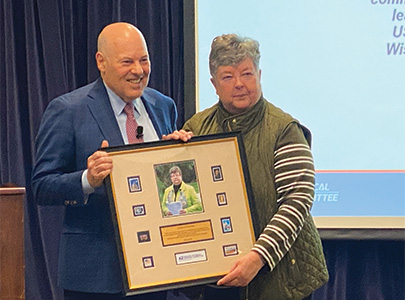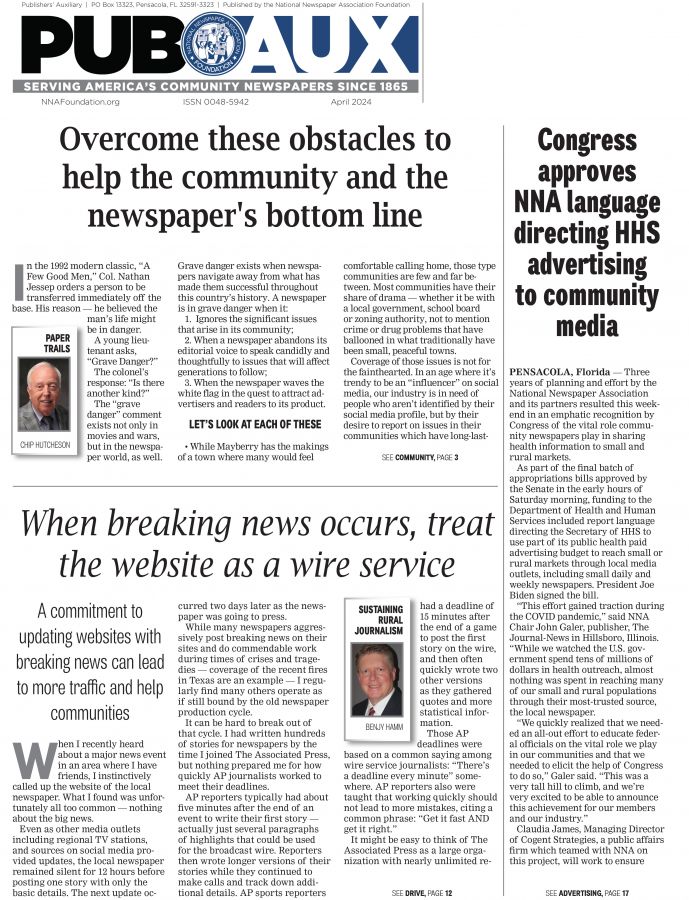How 3 Vermont newspapers keep the presses rolling
Aug 1, 2015
You’d have to be living under a rock to have missed the media news of the decade: Newspapers are struggling to survive in a world of readers who believe good journalism should be free—and delivered to their cellphones.
By MARK DAVIS, ALICIA FREESE and MOLLY WALSH
Reporters | Seven Days
You’d have to be living under a rock to have missed the media news of the decade: Newspapers are struggling to survive in a world of readers who believe good journalism should be free—and delivered to their cellphones.
When it comes to print, most of the arrows point downward in the Pew Research Center’s annual State of the News Media 2015 report. Although circulation increased 1 percent last year among publicly traded newspaper companies, that glimmer of hope was extinguished by a 4 percent drop in ad revenue during the same time period.
It seems that smart money can’t get out of the publishing business fast enough. “Three different companies in 2014 spun off more than 100 newspaper properties, in large part so that their still-robust broadcast or digital divisions would not be affected by the newspaper industry’s continuing financial woes,” Pew reported.
But that’s not how it’s going for Jeff Potter at the Commons, whose ambitious weekly is growing as fast as the daily Brattleboro Reformer is shrinking. Or the 10 employees who bought out the Barton Chronicle publisher rather than see the paper fall into the wrong hands. Or fourth-generation newsman Dick Drysdale at the Herald of Randolph, who is 70 and still going strong.
Those three are among many Vermont newspapers—mostly non-dailies—that are thriving. “Small is beautiful” may be the best way to explain the ongoing success of media properties such as the Stowe Reporter, now under new ownership; Seven Days, which turns 20 this year; and the community papers and magazines controlled by the Lynn family. Brothers Emerson and Angelo Lynn, their wives, and Angelo’s three daughters together run the Addison County Independent, the St. Albans Messenger, the Colchester Sun, the Mountain Times, Vermont Ski & Ride Magazine, Vermont Sports magazine, the Brandon Reporter, the Milton Independent and the Essex Reporter.
That three young women would return to Vermont to embrace such a risky business caught the attention of a media reporter from the New York Times. In the August 2013 story, their father offered one explanation: “Once you become part of a community, you see the good that a paper does. That’s very fulfilling.”
The benefits go both ways. Especially in rural communities, local newspapers provide useful information that residents can’t get anywhere else—including the Internet, which, as Randy Holhut from the Commons noted, in Vermont usually “sucks.”
3 small newspaper companies keep print alive
Trudy Blackburn has held a variety of jobs in the 33 years she has worked for the Barton Chronicle, her hometown paper. On Wednesdays, when the printer drops off copies of that week’s edition, she summons the delivery drivers and helps them load up their trucks. She’s also the office cleaning lady.
In January, Blackburn added another responsibility: owner.
She and nine other staffers pooled their money to buy the Chronicle from owner and founder Chris Braithwaite. Nearly six months into the arrangement, which is believed to be unprecedented in Vermont media, staffers there are happy to report that nothing much has changed about the Chronicle. It’s still delivering a mix of high-minded journalism and deep community engagement.
Braithwaite founded the Chronicle 41 years ago in southern Orleans County, one of the poorer areas in a struggling county of 27,000 residents. What residents called the “hippie paper” has since become a local institution. About 7,500 people pay $27 a year to receive the weekly paper and get online access to the website. Subscribers include locals who have moved away to Florida but still want to know what is going on in the Northeast Kingdom. Parents sign up children who go off to college or into the military.
While dailies across Vermont hemorrhaged staff in recent years, the Chronicle hasn’t laid off a single employee. In fact, the paper, which Braithwaite said grosses a “little under” $1 million in annual revenue, just hired two employees.
Reporters cover Barton, Glover and other area towns with zeal, and they aren’t afraid of more ambitious stories—editor Tena Starr recently published an 1,800-word piece headlined “The Risks of Renting,” examining regulations that protect bad tenants and the effect on local rental rates.
Braithwaite was inducted into the New England Newspaper & Press Association’s Hall of Fame last year. Anne Galloway, the founder of VTDigger.org, and WCAX-TV anchor Darren Perron both cut their teeth at the Chronicle’s Water Street headquarters.
“Papers can prosper; you just have to find your niche,” said Starr. “Nobody is going to go online, go on Yahoo! News, and find out that the Irasburg Fire Department is really upset that their appropriation got cut and that there’s a special town meeting called. Community newspapers really have a role, and if you have people who are running the paper and living in those communities who care and know what’s going on—I think that still works.”
There’s a softer side to being committed to hyper-local news. Last week, two readers walked into the Chronicle’s office with pictures they hoped the paper would publish: One brought a shot of her child winning a school award; the other, an image of a rare, three-bearded turkey. The Chronicle dutifully ran them both.
In 2013, Braithwaite, now 71, told his staff that he wanted to retire. None of his four children was interested in running the family business, so he informed them that he intended to hire a broker to help him find a new owner.
The obvious buyers, a local competitor or a small regional chain, made Braithwaite and his staff uneasy. The broker told him that, although the Chronicle was financially stable, it was investing more revenue in people than most of its peers.
“I said, ‘I know; that’s why we have a good paper,’” Braithwaite said. “That’s the first thing any owner would have done: cut payroll and people, probably in the editorial department.”
Braithwaite dreamed of selling to an employee, but soon realized that anyone who had spent his or her career working at a small community weekly likely wouldn’t have the money to buy him out. So he proposed a group-purchasing plan via interoffice memo, hoping a number of staff members might be interested. He was shocked when all but a few of the dozen-plus employees said they wanted in. Interested parties ranged from Starr and General Manager Tracy Davis Pierce to Blackburn and delivery driver Billy Thompson.
“It was a great surprise,” Braithwaite said. “It was moving to have people in what seemed were very casual jobs at the paper want to be involved. They weren’t so casual after all.”
The new owners said it wasn’t a tough decision.
“Many of us have been here working at the paper for a long time,” said Starr, who started in 1981. “We didn’t want some outside entity to change it. We did not want the Chronicle to be owned by someone, or some company, that would radically alter its nature. We have faith in the Chronicle.”
Although the Chronicle has not disclosed the details of the sale, Braithwaite shared some information about the arrangement. The employees bought varying amounts of 20 shares formerly controlled by Braithwaite and his wife, Ellen. The combined selling price of those shares, Braithwaite said, was less than $100,000.
The rest of the couple’s shares were transferred to the Chronicle’s corporate entity. The paper’s retained earnings paid for a small portion of the purchase, Braithwaite said, but most of it was financed by a personal loan he extended to the 10 new owners. Draft rules state that only Chronicle employees can own shares. New hires would be allowed to purchase shares from outgoing or existing employees if they were available.
The Chronicle has seven years to pay back the Braithwaites. The scheduled payments are roughly equivalent to the profits the Braithwaites had been distributing to themselves.
If the paper were to go under, employees would lose their shares, but the Braithwaites would take a much larger hit.
“You would describe it as a highly leveraged deal,” Braithwaite said. “It’s almost an unsecured loan. If there’s any risk, it’s fair to say Ellen and I took the lion’s share.”
Braithwaite had already stepped away from day-to-day newsroom management. He’d been going abroad for months at a time to assist newspapers in fledgling democracies. When he was home, he got himself arrested covering the Lowell Mountain wind project.
In other words, the Chronicle was used to operating without him. Pierce handles the business side of the company, while Starr manages the editorial side.
Are their interactions any different now that they’re two of 10 owners? The group hasn’t even met formally yet. There’s been no talk of taking a dividend or changing the management structure, or any conflict—Starr said she isn’t even sure which employee owns the most shares.
“Tracy and I talk a lot more, and everybody talks a lot more about small things,” Starr said.
Recently, the Chronicle decided to start charging $25 for obituaries; most newspapers long ago stopped publishing obituaries for free. The new owners hashed out the issue through casual office conversations and phone calls.
“We pretty much came to a consensus, or at least a vast majority,” Starr said. “But everybody had a say.”
Small-town editor
In the four decades he’s been a small-town editor and publisher, Dick Drysdale has received a steady stream of newsmakers, advertisers, fans and the occasional critic in his cluttered Pleasant Street office in downtown Randolph.
One reader threatened to push “my teeth down my throat,” 70-year-old Drysdale recalled. “He was a well-known blowhard, and I just dismissed him from my office.”
It’s all in a day’s work at the Herald of Randolph, a 5,500-circulation weekly that’s been in business since 1874. Even in the digital era, the print edition, published every Thursday, enjoys a loyal following.
The paper’s focus is unchanged: community life in the rural White River Valley, and introducing people to one another in the 16-community zone the Herald writes about.
“That’s been our role from the very beginning,” Drysdale said.
He would know. Tall and bearded with a full head of hair and a dry wit, Drysdale essentially grew up at the Herald, which has had only four publishers since it was founded. His father—publisher No. 3—bought the paper in 1945 and sold it to his son in 1971. The young Dick Drysdale had gone away to college and worked a few years out of state before returning to Vermont for what he thought would be a short reporting gig at the Herald. “Damned if I didn’t like it,” Drysdale recalled.
After a year, his father sat him down and said: ‘I’m tired, and if you want the paper, now is when,’ Drysdale recalled. “I was 26.”
Over the decades, the Herald has reliably covered local government, warts and all.
“I think we’ve made a difference in some of the controversies,” Drysdale said happily. “There were a couple of town managers that got pretty upset with us and eventually resigned.”
Along with stories about crime, taxes, accidents, local politics and weather—the Herald won top honors from the Vermont Press Association in 2013 for coverage of Tropical Storm Irene—the newspaper covers many community events. Photos are played big on the giant broadsheet pages. A recent front page told of a heroin overdose; inside were pictures of high school athletes running hurdles, a camouflage-clad 10-year-old hunter holding up a wild turkey and smiling people swirling at a contra dance.
The number of paid subscribers has dropped somewhat over the last decade, but the paper has a dedicated base of supporters, including at least 1,000 readers who get it out of state via U.S. Postal Service for $43 a year; in-state subscribers pay $37. The Herald’s digital paywall doesn’t do as well.
“I have not put much energy into it because I have not figured out how to make much money at it,” Drysdale admitted, echoing newspaper publishers across the nation.
Like his mother, a local school board member who wrote about public education for the Herald, Drysdale sometimes covers the work of the boards on which he serves. At many larger newspapers, that would be considered a conflict of interest.
Drysdale sees it differently.
After three fires burned a gaping hole into downtown Randolph in the 1990s, he served on the Randolph Area Community Development Corp. board. Drysdale wrote about the group’s work, which led the effort to rebuild Main Street and weighed various proposals for new uses that naturally generated debate.
“I think I was able to write about it not from an advocate position but just giving the facts,” he said.
With a staff of just 10 people, Drysdale does a little bit of everything. He writes three or four stories a week. He also pens a weekly editorial and functions as a collection agency with advertisers.
“I make the calls every month to people who don’t pay—personal calls,” Drysdale said of the unsavory task.
Earlier this year, Drysdale was inducted into the Hall of Fame by the New England Newspaper & Press Association, which recognized his leadership at a paper that has won many awards for breaking news, photography and arts criticism.
On a recent May morning, with the lilacs in bloom along the twisting roads leading to Randolph, a reporter might be tempted to describe the scene as bucolic. But plenty of horrific things have happened in the area—during Drysdale’s watch. When two teenagers from Chelsea were charged with the brutal murder of two married Dartmouth professors in 2001, the community was aghast. Could two of their own young people have committed such evil?
“I can still remember the editorial I wrote,” Drysdale said. “It was back before we even knew they were guilty. It was [about how] we were hoping against hope.”
But as the paper would soon report in detailed stories, the two were found guilty by the court.
The Herald closely followed another unfathomable crime, the 2008 rape and murder of 12-year-old Brooke Bennett by her uncle, Michael Jacques of Randolph. In that case, the Herald’s reporting helped dispel rumors circulated by Jacques himself that an international sex ring was connected to the crime.
Squelching untruths and replacing them with facts is what a good newspaper should do, Drysdale said—and the Herald has for 141 years.
Of course, there has been plenty of happy news over the years, too, such as the day a man came rushing into the Herald office asking to borrow a camera.
“I was sitting in the office, this guy bursts in and says, ‘Hi, I’m David Mamet, and I need your camera,’“ Drysdale recalled.
Yes, it was the famous playwright, a part-time Vermonter whose wife was giving birth at Gifford Memorial Hospital in Randolph. Drysdale loaned Mamet the camera.
Drysdale and his wife have two grown sons, who so far aren’t interested in running the newspaper. It’s unclear who might be publisher No. 5.
“I’m certainly thinking of retiring if the opportunity occurs,” Drysdale said. Is there a sale in the offing? Drysdale politely declined to answer, saying: “No, I don’t want to deal with that at all.”
Every reporter who has been around as long as Drysdale knows that responding “no comment” is not the same as “no” or “never.”
Deep into the commons
A cheesemonger, a convicted burglar, a filmmaker and two veteran editors are deep in conversation. Welcome to the Commons newsroom. This eclectic group puts out a free, weekly paper that is prospering, against the odds, in Windham County.
Based in Brattleboro—a nudity-friendly haven for artists and activists—the Commons was created by residents upset about the corporatization of southern Vermont’s once-dominant daily, the Brattleboro Reformer. As the Reformer has scaled back, this fiercely local shoestring publication has picked up the slack.
The shake-up started in 2004: When the Reformer fired its managing editor, Kate Casa, a group of her supporters stormed the newsroom, cameraperson in tow, and demanded she be reinstated.
The coup failed, but the disaffected troupe came up with a more levelheaded solution: They created a monthly newspaper, set up as a nonprofit to ensure it wouldn’t fall into corporate hands.
In the beginning, it was run entirely by volunteers who pitched in their own money. “We survived for years mostly on the fumes of idealism,” said Barry Aleshnik, the only founder who still serves on the board of directors.
But in 2008, the Commons board hired Jeff Potter as a full-time editor in chief. Aleshnik credits Potter, who is now also the publisher, with assembling a talented staff that turned the Commons into a “must-read” publication—and a viable business.
As it outgrew its “hippie rag” reputation, the paper also became a landing spot for talent leaving the depleted daily. In 2010, the Reformer’s day editor, Randy Holhut—whose job was on the chopping block—decamped to the Commons, where he’s now deputy editor. Fran Lynggaard Hansen, a former Reformer columnist, also started writing for the weekly.
Years before he made the switch, Holhut remembered scoffing at the upstart paper: “To us at the Reformer, it was a strident, smeary mess, a paper that spoke to the activist community.” Lynggaard Hansen predicted it would flop. Now, she said, “I underestimated this group greatly.”
Potter, she noted, wears “literally dozens of hats.” The unabashedly geeky 48-year-old, who’s prone to quoting Time Warner cartoon characters, wrote the code for the Commons’ website. He also designs the paper each week.
Media critic and former Reformer Publisher Martin Langeveld thinks the Commons turned the corner in 2010, when it switched to a weekly format and expanded its coverage.
“It started as a monthly—which doesn’t really serve a community very well—with a distinctly political and activist slant to it,” Langeveld said. “What it has evolved into is a community newspaper.”
2011 was a tough year for Brattleboro: In April, a historic Main Street building burned down; in August, Tropical Storm Irene ravaged the town; a month later, a man murdered the wine manager at the peace-loving downtown co-op. The Commons hit its stride during this spree of calamitous events, covering breaking news and following up with in-depth stories. At the Vermont Press Association awards the following year, the paper took home the plaque for General Excellence in the non-daily category.
Coincidentally, the Commons nearly collapsed the next day, according to Potter. It relied heavily on two donors, one of whom had abruptly jumped ship. The board of directors found someone else to fill the funding shortfall, but the incident left an impression.
Potter has since made progress diversifying the paper’s revenue streams. With the growth of ad sales—which now make up 70 percent of total income—it’s far less dependent on any one deep-pocketed donor.
The Commons’ circulation is also on the rise, which signals growing demand among readers. From a low point of 4,500 after the paper first went weekly, it’s up to 9,100 and is now available at 210 locations—and counting—across the county. Revenue from advertising increased 30 percent in the past year. Several hundred “members” voluntarily pay a subscription fee.
Meanwhile, the Reformer’s readership has plummeted, it’s changed corporate ownership twice and a third sale is rumored to be imminent.
Located in a refurbished shoe factory on Main Street in Brattleboro, the Commons recently expanded into another office with mostly bare walls and disassembled desk parts stacked in a pile. That’s to accommodate a growing staff of four full-timers, six part-timers, and a large cadre of freelancers and volunteers.
They take the notion of being a community newspaper literally. Last Tuesday afternoon, dressed in varying shades of khaki, Potter was laying out pages for the paper that would be printed that evening. A convicted burglar, who asked that her name be withheld, observed over his shoulder. She’s apprenticing with the paper through a partnership with a diversion program for women convicted of nonviolent, substance-abuse-related crimes.
Editors and reporters teach “media mentoring” workshops for community members on subjects such as interviewing and photojournalism. They’ve designed journalism curricula for local schools and helped several of them start or resurrect school newspapers.
And, of course, they hustle to keep up with the news. Potter is infamous for working through the night, stealing naps on another building tenant’s couch. Olga Peters—a filmmaker turned reporter—once worked 21 days straight.
The paper’s dependence on a handful of people working in overdrive also raises a question: What happens if they leave?
Turning to his boss, Holhut said, “If you get hit by a bus, we’d be totally screwed.”
Potter is mindful of this concern and, at the board’s urging, he’s been training other people in preparation for handing off a few of his hats.
For now, he’s counting his blessings.
Many Windham County readers still like their news on paper. The population skews elderly.
“They love us in the nursing homes,” Holhut noted. But more than that, he continued, “You have a really intelligent, literate and media-savvy population that loves to read about itself.” And, he added, “The Internet here sucks.”
But older readers and slow Internet speeds won’t last forever. Langeveld has urged the Commons to revitalize its Web presence, which, he observed, looks abysmal on a smartphone.
During an interview recently, Potter conceded the point and said he’s working on it. But he had a more pressing concern: the next week’s paper.
Nearby, Wendy Levy—the cheesemonger turned municipal reporter—typed on her laptop.
“Yes!” she said, gleefully. The public access TV station had just posted the footage she’d been waiting on for her next story, about a Dummerston selectboard meeting. © Seven Days 2015
Every Wednesday, Burlington, VT-based newsweekly Seven Days serves up a lively mix of local arts, news, food, politics and culture. Its award-winning staff produces five additional publications, as well as the weekly Web video series, “Stuck in Vermont,” and the Bernie Beat—an online archive of stories, photos and interactives chronicling the career of presidential candidate Sen. Bernie Sanders. Find all of the above at sevendaysvt.com.













